
THE DEBATE ON THE CONSTITUTION
PART TWO
THE DEBATE ON THE CONSTITUTION
Federalist and Antifederalist Speeches, Articles, and Letters During the Struggle over Ratification
PART TWO
_______________
DEBATES IN THE PRESS AND IN PRIVATE CORRESPONDENCE
January 14August 9, 1788
DEBATES IN THE STATE RATIFYING CONVENTIONS
South Carolina, May 1224, 1788
Virginia, June 227, 1788
New York, June 17July 26, 1788
North Carolina, July 21August 4, 1788
_______________

THE LIBRARY OF AMERICA
Volume compilation, notes, and chronology copyright 1993 by
Literary Classics of the United States, Inc., New York, N.Y.
All rights reserved.
No part of this book may be reproduced commercially
by offset-lithographic or equivalent copying devices without
the permission of the publisher.
Some of the material in this volume is copyright 1984, 1986, 1988, 1988, 1990, 1992 by the State
Historical Society of Wisconsin; copyright 1961 by
Wesleyan University; copyright 1977
by the University Press of Virginia. Reprinted by permission. For acknowledgments, see Note on the Texts.
THE LIBRARY OF AMERICA, a nonprofit publisher, is dedicated to publishing, and keeping in print, authoritative editions of Americas best and most significant writing. Each year the Library adds new volumes to its collection of essential works by Americas foremost novelists, poets, essayists, journalists, and statesmen.
If you would like to request a free catalog and find out more about The Library of America, please visit with your name and address. Include your e-mail address if you would like to receive our occasional newsletter with items of interest to readers of classic American literature and exclusive interviews with Library of America authors and editors (we will never share your e-mail address).
Print ISBN: 978-0-940450-64-6
eISBN 978-1-59853-118-3

QED stands for Quality, Excellence and Design. The QED seal of approval shown here verifies that this eBook has passed a rigorous quality assurance process and will render well in most eBook reading platforms.
All eBook files created by eBook Architects are independently tested and certified with the QED seal. For more information please see:
ebookarchitects.com/QED.php
BERNARD BAILYN
SELECTED THE CONTENTS AND WROTE
THE HEADINGS AND NOTES FOR THIS VOLUME
The Debate on the Constitution: Part Two
is kept in print
by a gift from
MR. & MRS. THOMAS W. SMITH
to the Guardians of American Letters Fund,
established by The Library of America
to ensure that every volume in the series
will be permanently available.
The publishers also express their appreciation to
John P. Kaminski and Gaspare J. Saladino, editors of
The Documentary History of the Ratification of the Constitution,
and the State Historical Society of Wisconsin, the publisher,
for editorial assistance, the use of archival materials, and
permission to reprint extensive excerpts.
DEBATES IN THE PRESS AND IN PRIVATE CORRESPONDENCE
January 14August 9, 1788
ON THE LIKELY FAILURE OF LIBERTY: THE DISSENT OF TWO NEW YORK DELEGATES TO THE PHILADELPHIA CONVENTION
Robert Yates and John Lansing, Jr., to Governor George Clinton
Daily Advertiser (New York), January 14, 1788
Albany, Dec. 21, 1787.
SIR, We do ourselves the honor to advise your Excellency, that, in pursuance of concurrent resolutions of the Honorable Senate and Assembly, we have, together with Mr. Hamilton, attended the Convention appointed for revising the articles of Confederation, and reporting amendments to the same.
It is with the sincerest concern we observe, that in the prosecution of the important objects of our mission, we have been reduced to the disagreeable alternative of either exceeding the powers delegated to us, and giving our assent to measures which we conceived destructive of the political happiness of the citizens of the United States; or opposing our opinion to that of a body of respectable men, to whom those citizens had given the most unequivocal proofs of confidence. Thus circumstanced, under these impressions, to have hesitated would have been to be culpable. We therefore gave the principles of the Constitution, which has received the sanction of a majority of the Convention, our decided and unreserved dissent; but we must candidly confess, that we should have been equally opposed to any system, however modified, which had in object the consolidation of the United States into one Government.
We beg leave briefly to state some cogent reasons which, among others, influenced us to decide against a consolidation of the States. These are reducible into two heads.
First. The limited and well defined powers under which we acted, and which could not, on any possible construction, embrace an idea of such magnitude as to assent to a general Constitution in subversion of that of the State.
Secondly. A conviction of the impracticability of establishing a general Government, pervading every part of the United States, and extending essential benefits to all.
Our powers were explicit, and confined to the sole and express purpose of revising the articles of Confederation, and reporting such alterations and provisions therein, as should render the Federal Constitution adequate to the exigencies of Government, and the preservation of the Union.
From these expressions, we were led to believe that a system of consolidated Government, could not, in the remotest degree, have been in contemplation of the Legislature of this State, for that so important a trust, as the adopting measures which tended to deprive the State Government of its most essential rights of Sovereignty, and to place it in a dependent situation, could not have been confided, by implication, and the circumstance, that the acts of the Convention were to receive a State approbation, in the last resort, forcibly corroborated the opinion, that our powers could not involve the subversion of a Constitution, which being immediately derived from the people, could only be abolished by their express consent, and not by a Legislature, possessing authority vested in them for its preservation. Nor could we suppose, that if it had been the intention of the Legislature to abrogate the existing Confederation, they would, in such pointed terms, have directed the attention of their delegates to the revision and amendment of it, in total exclusion of every other idea.
Next page
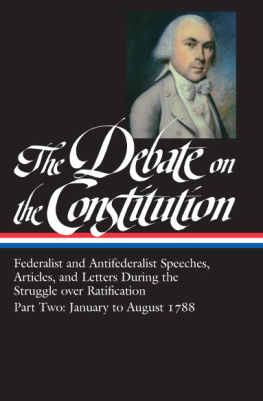
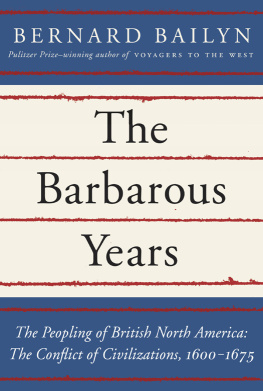


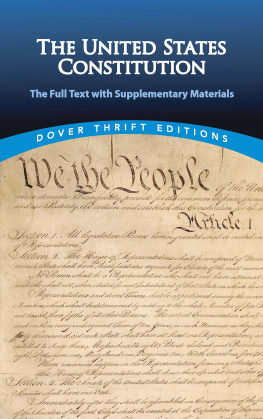
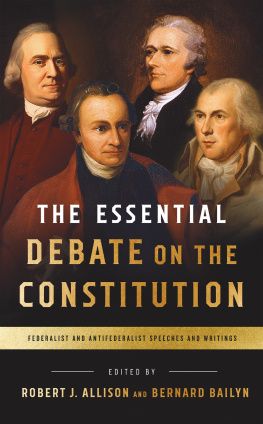
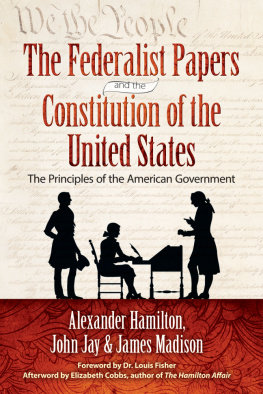

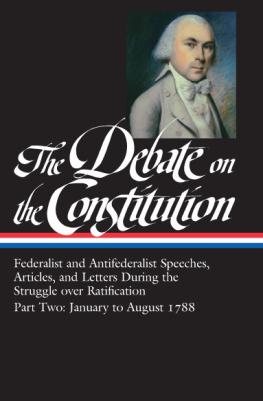
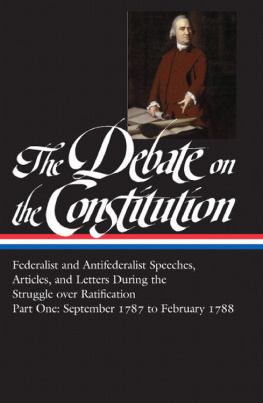
![Jay John - The Federalist : a collection of essays, written in favour of the new Constitution, as agreed upon by the Federal Convention, September 17, 1787. : In two volumes. Vol. I[-II.]](/uploads/posts/book/76130/thumbs/jay-john-the-federalist-a-collection-of-essays.jpg)



